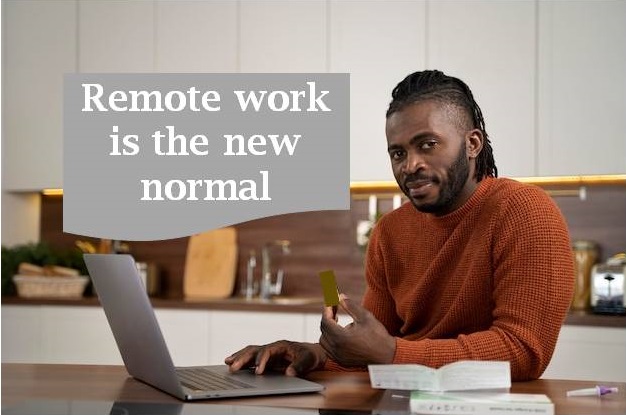How To Achieve Healthy Work-Life Balance: Tips for Africans
By: Foluke Akinwalere. Freelance Health Writer. Medical review and editorial support provided by the DLHA Team

Partial image of a black individual showcasing a wooden work-life balance scale. Photo Credit: Freepik
In today’s fast-paced and interconnected world, achieving a healthy work-life balance can feel like an impossible goal. Many professionals struggle with constant work demands, neglected personal time, and the persistent stress of managing both worlds. However, creating harmony between work and personal life is essential—not just for your productivity but also for your mental and physical well-being.
In this guide, you will learn work-life balance tips and methods to help you manage your diverse responsibilities effectively while making time for what truly matters. Let’s dive into the actionable steps you can take to create a work and personal life harmony that lasts.
A healthy work-life balance doesn’t mean dividing your time equally between work and personal life. Instead, it’s about putting your priorities in order and managing your time in a way that prevents work from dominating your personal life—or vice versa.
In today’s digital age, where emails and notifications dim the lines between professional and personal time, setting boundaries becomes more important.
Achieving balance is about prioritising what matters most, being intentional with your time, and recognising when you need to reset. Work-life balance is a cycle, not an achievement, [1] this means it is an ongoing process, not a one-time goal.
Are you constantly tired, feeling unproductive despite long hours, or neglecting your personal life? These are signs that your work-life balance needs attention.
Here are some common red flags:
Ignoring these signs can lead to long-term physical and mental health problems for both your professional success and personal well-being.
Let’s explore work-life balance tips that can help you regain control.
Task management tool (The Eisenhower matrix). CLick on image to enlarge
One of the most effective ways to create a work and personal life harmony is by learning to focus on what truly matters.
Use life skills tools like the Eisenhower Matrix to allocate tasks based on urgency and importance.
By prioritising effectively, you’ll not only reduce stress but also free up time for personal activities.

Photo credit: Freepik.
One of the biggest challenges in achieving work-life balance is the inability to separate work from personal life.
Clear boundaries help prevent burnout and allow you to enjoy downtime without interruptions.

A black woman engaging in mindfulness practice outdoor. Photo credit: Freepik
Neglecting self-care is a sure path to burnout. Self-care isn’t just a luxury—it’s a necessity for maintaining productivity and well-being. Treat personal time with the same importance as a work meeting.
When you prioritise self-care, you’ll find that both your work and personal life improve significantly.

Photo credit: Freepik.
It’s easy to feel overwhelmed when you say “yes” to every request. Learning to say “no” is a vital step in achieving a healthy work-life balance.
Boundaries are not just about time—they’re about energy too.

A black lady looking at her phone. Image credit: Freepik
Technology can either enhance your productivity or contribute to burnout—it all depends on how you use it.
When used wisely, technology can help you save time and stay focused without constant distractions.

A black mother and child spending time together. Image credit: Freepik
Your relationships—both personal and professional—are a crucial part of achieving balance.
Building strong personal and professional connections helps you navigate life’s demands more effectively.

A black professional working remotely from home. Image credit: Freepik
Remote work, whether fully from home or through hybrid arrangements that split time between home and office, has become the new normal globally and in Africa.
Since the COVID-19 pandemic began in 2020, many have had to adapt to these evolving work styles. For some, it’s been their introduction to the workforce, starting their careers in remote roles without ever stepping into a traditional office setting.
Working from home has its perks, but also dims the lines between work and personal life. It brings unique challenges that can take a toll on your mental health.
The shift can lead to increased stress, dips in motivation, anxiety, and feelings of uncertainty. On top of that, many struggle with concerns about job security or struggle to find the right balance between work, personal responsibilities, and family life.
Here’s how you can maintain balance:
Remote work doesn’t have to mean “always on.” With the right strategies, you can enjoy flexibility without compromising your well-being.
A healthy work-life balance has many benefits for you and your employer, including:
Improved health and well-being are achieved when a healthy work-life balance is maintained, as burnout and stress are less likely to be experienced, reducing absenteeism and the risk of physical and mental health problems.
A better work-life balance allows your brain and body to rest and recharge, helping you to perform at your best. It also boosts your motivation when you return to work.
When you are satisfied with your jobs, you are more likely to perform well and be engaged, because life will feel more fulfilling when priorities are aligned.
A healthy work-life balance can allow you to take time for hobbies, travel, and other experiences that can spark new ideas.
Spending quality time with your loved ones strengthens connections, and enhances happiness, creating a deeper sense of belonging and fulfillment.
Balance isn’t just a goal—it’s a lifestyle choice that impacts every area of your life.
Achieving balance can be tough, even with the best intentions, especially when unexpected challenges arise. Here’s how you can tackle them:
Many feel guilty when they prioritise personal time over work. To overcome this:
Last-minute tasks can throw off your routines. To handle them:
Change doesn’t happen overnight. Start small by introducing one new habit at a time, for instance, logging off 30 minutes earlier or scheduling one self-care activity weekly. Gradually increase these changes until they become routine.
Creating a healthy work-life balance isn’t just a goal—it’s a lifestyle choice that requires intentional effort and consistency. By prioritising tasks, setting boundaries, and making time for self-care, you can achieve the harmony you need to thrive both personally and professionally.
Remember, balance looks different for everyone. Experiment with these work-life tips and find what works best for your unique needs.
Related:
Published: January 20, 2025
© 2025. Datelinehealth Africa Inc. All rights reserved.
Permission is given to copy, use and share content freely for non-commercial purposes without alteration or modification and subject to source attribution.
DATELINEHEALTH AFRICA INC., is a digital publisher for informational and educational purposes and does not offer personal medical care and advice. If you have a medical problem needing routine or emergency attention, call your doctor or local emergency services immediately, or visit the nearest emergency room or the nearest hospital. You should consult your professional healthcare provider before starting any nutrition, diet, exercise, fitness, medical or wellness program mentioned or referenced in the DatelinehealthAfrica website. Click here for more disclaimer notice.